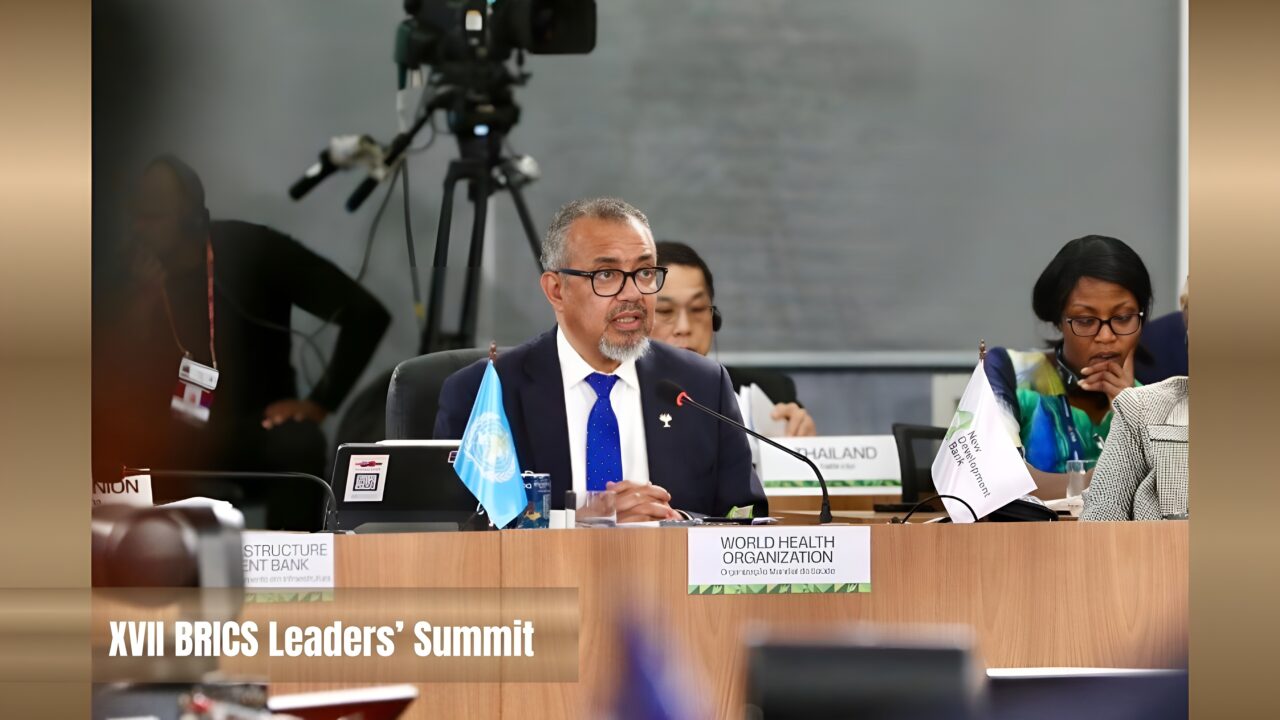
Breaking: WHO Urges BRICS to Advance Health Equity Through Multilateralism and AI
Alexey Kulikov, Head of Partnerships and Operations, Deputy Head of Secretariat, United Nations Task Force on NCDs, posted on X:
”The World Health Organization (WHO) Director-General’s Dr Tedros Adhanom Ghebreyesus remarks at the XVII BRICS Leaders’ Summit, session on Strengthening Multilateralism, Economic-Financial Affairs, and Artificial Intelligence:
‘Your Excellency President Lula da Silva, Excellencies, Heads of State, Heads of Government, Heads of delegation, Dear colleagues and friends, Thank you, President Lula, and Brazil’s BRICS Presidency for your commitment to equity, solidarity, and multilateralism.
My intervention will focus on three key issues: challenges to multilateralism, cuts to Official Development Assistance, and the role of AI and other digital tools.
First, we are facing significant challenges to multilateralism.
However, there was good news at the World Health Assembly in May.
WHO’s Member States demonstrated their commitment to international solidarity through the adoption of the Pandemic Agreement. South Africa co-chaired the negotiations, and I would like to thank South Africa.
It is time to finalize the next steps.
We ask the BRICS to complete the annex on Pathogen Access and Benefit Sharing so that the Agreement is ready for ratification at next year’s World Health Assembly. Brazil is co-chairing the committee, and I thank Brazil for their leadership.
Second, are cuts to Official Development Assistance.
Compounding the chronic domestic underinvestment and aid dependency in developing countries, drastic cuts to foreign aid have disrupted health services, costing lives and pushing millions into poverty.
The recent Financing for Development conference in Sevilla made progress in key areas, particularly in addressing the debt trap that prevents vital investments in health and education.
Going forward, it is critical for countries to mobilize domestic resources and foster self-reliance to support primary healthcare as the foundation of universal health coverage.
Because health is not a cost to contain, it’s an #investment in people and prosperity.
Third, is AI and other digital tools.
Planning for the future of health requires us to embrace a digital future, including the use of artificial intelligence. The future of health is digital.
AI has the potential to predict disease outbreaks, improve diagnosis, expand access, and enable local production.
AI can serve as a powerful tool for equity.
However, it is crucial to ensure that AI is used safely, ethically, and equitably.
We encourage governments, especially BRICS, to invest in AI and digitalhealth, including governance and national digital public infrastructure, to modernize health systems while addressing ethical, safety, and equity issues.
WHO will be by your side every step of the way, providing guidance, norms, and standards.
Excellencies, only by working together through multilateralism can we build a healthier, safer, and fairer world for all.
Thank you. Obrigado.”
At the XVII BRICS Leaders’ Summit, WHO Director-General Dr. Tedros highlighted the need to strengthen multilateralism, restore development aid, and responsibly harness AI for health equity.
He urged BRICS nations to advance the Pandemic Agreement and invest in ethical, safe digital health solutions.
Hemostasis Today, your daily brief on key medical developments.
-
Feb 26, 2026, 12:05Anirban Sen Gupta: PlateChek Links Platelet Status to Hemostasis Outcomes in Whole Blood
-
Feb 25, 2026, 16:47Alan Nurden: Platelet Defects Explain Bleeding in EHDS Patients
-
Feb 25, 2026, 16:40Mohammed Almohammadi: Uniting Leaders in Laboratory Hematology at the 1st Saudi ISLH Joint Conference
-
Feb 25, 2026, 16:37Salihu Asimawu: Inflammation Is Not a Disease – Hats Off to the Heroes Inside Us
-
Feb 25, 2026, 16:34Michael Makris: Biomarin Has Decided to Withdraw Roctavian from the Market
-
Feb 25, 2026, 16:25Tagreed Alkaltham: The Blood Banker Personality
-
Feb 25, 2026, 16:17Sanjay Ahuja: Insightful Talk on 100 Years of VWD by Jorge Di Paola
-
Feb 25, 2026, 15:20Michael Shapiro։ Creating Real Pathways for Trainees in Preventive Cardiology
-
Feb 25, 2026, 15:15Ajay Kumar: Plasma Component Quality Control Standards

